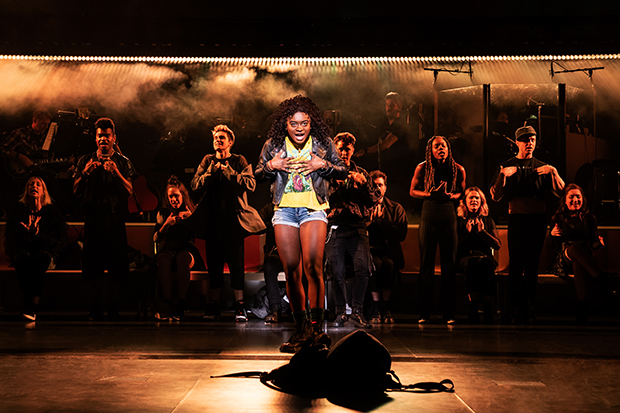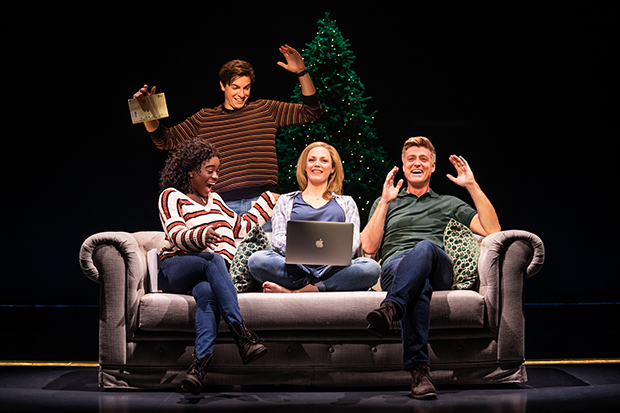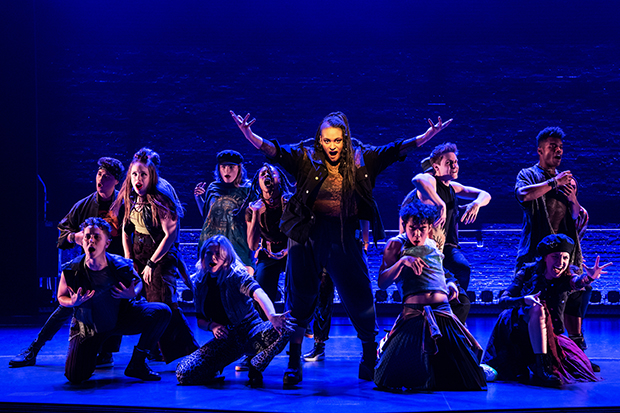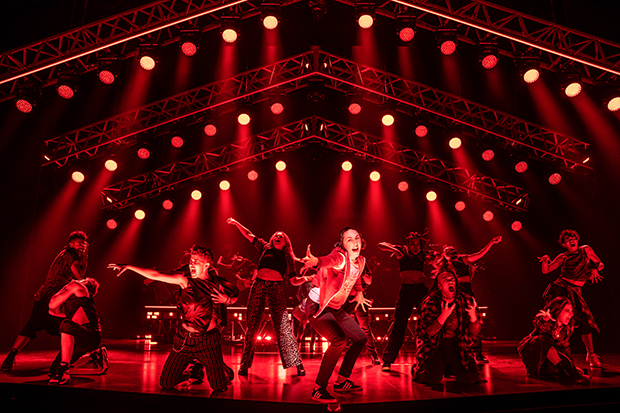Alanis Morissette's Jagged Little Pill Becomes Diablo Cody's Jagged Little Broadway Musical

(© Matthew Murphy)
Alanis Morissette was a figure of dark fascination in my childhood. It was autumn 1995, a few months after the release of her breakthrough album Jagged Little Pill, when a boy in the back of the school bus told me with wide-eyed sincerity of Morissette's ability to pen a song in under 10 minutes, because the devil was singing them into her ear. I was 9 at the time, and didn't have the dramaturgical wherewithal to recognize the clichéd charge against an outspoken young woman — par for the course in the country that produced The Crucible.
Today I can appreciate Jagged Little Pill, which is now the basis of a Broadway musical at the Broadhurst Theatre, for the real power it contains, which is a kind of dark magic: Each listen rekindles the pain of an ugly breakup when you're 21 and completely misunderstood. The album is a monument to the maenadic fury of Generation X. That's why it's so disappointing that this stage version mummifies that music in the toilet paper of its book.

(© Matthew Murphy)
Rather than present a biography of the artist (which has its own pitfalls and would feel premature for the 45-year-old singer-songwriter), book writer Diablo Cody goes for an original story (the Oscar-winning screenwriter of Juno is making her Broadway debut). It's about the Healys, an upper-middle-class Connecticut family. The show opens with Mary Jane (Elizabeth Stanley) composing the Christmas newsletter. She makes sure to brag about the promotion of her husband, Steve (Sean Allan Krill), and the European vacation they shared with their children, Nick (Derek Klena) and Frankie (Celia Rose Gooding). We're meant to sniff at this propaganda from the beginning, and we do.
Sure enough, the facade deteriorates rapidly as we witness scenes of marital malaise and teenage rebellion. Frankie (who is black, adopted, and bisexual) doesn't feel respected by her white-bread family, while Nick worries that his Harvard admission will be revoked after he fails to stop a sexual assault. Steve escapes suburban purgatory by viewing elaborate pornography on his MacBook, and Mary Jane takes a spaced-out trip to Trader Joe's. Purdue Pharma seems to have declined a product placement for OxyContin, but we all know what mom is buying in the alley behind Connecticut Muffin.
While director Diane Paulus crams as many brands onstage as she can, Cody seems to have worked from a checklist of relevant social issues: structural racism, check; sexual assault, check; gender nonconformity, check; opioids, check. No topic is given the consideration it deserves as Cody furiously pushes her next hot button, but never hard enough to actually offend paying customers.

(© Matthew Murphy)
The game is exposed early during the song "All I Really Want," which becomes a mother-daughter feud. Frankie taunts Mary Jane with the lyric, "Why are you so petrified of silence? Here, can you handle this?" We brace for a shock, but the "this" turns out to be a protest sign reading "Fear has no place in our schools." It's a sentiment to which not even an arch-conservative NRA spokesman would object. Cody's fraudulent portrayal of youth counterculture begins to look like something a lot more cynical: It's a $189 locally sourced organic cardigan in which to wrap one's guilt about being part of a class that can afford to see a Broadway show. We can feel its warmth and our own righteousness — that is, if we shut our eyes and ears.
In an effort to distract us from this lack of substance, Paulus ramps up the drama to levels that regularly cross the line into camp: The actors scream-sing in one another's faces. A shouting-in-the-kitchen scene is punctuated with a slap. Sidi Larbi Cherkaoui's Pilobolus-like choreography gives the staging an air of experimentation, but is often cringey in its own way, like when a song about sexual assault is illustrated by the many hands of the ensemble molesting the vocalist. When a kindly therapist arrives, one suspects that we're watching an industrial musical for the American Counseling Association.
There is a precedent for this kind of show, which pokes at bourgeois sensitivities in an effort to make its audience extol how real it is (even though it is nothing of the sort). This is a mantle worn by Dear Evan Hansen (which is more focused, and therefore more successful) and before that, Next To Normal (that show's composer, Tom Kitt, serves worthily as music supervisor and orchestrator here).

(© Matthew Murphy)
The musical performances offer the one saving grace: Stanley delivers haunting renditions of "Smiling" (an unreleased Alanis song) and "Uninvited" (several Morissette songs not on JLP make an appearance). As Jo, Frankie's scorned lover, Lauren Patten gives a scorching performance of "You Oughta Know." Lighting designer Justin Townsend aims two red LEDs right at her cheeks so we can literally see the flames on the side of her face as she roars.
The design is competent, with Riccardo Hernández's set getting the job done without leaving much of an impression. The sound design (by Jonathan Deans) showcases the music and adds a few ghostly echoes without announcing itself too aggressively. Emily Rebholz's costumes suggest continuity between the mid-'90s and today, with the ensemble wearing ripped jeans and bulky sweatshirts tied around their waists. Perhaps they are wearing these retro duds ironically — but only as defined by the Alanis Morissette lexicon.
A cutesy-poo scene that attempts to poke fun at Morissette's infamous misuse of the literary device failed to convince me that this show has any sense of humor, least of all about itself and its airs of social justice. Posing as harsh medicine, ''Jagged Little Pill' is a theatrical placebo.










